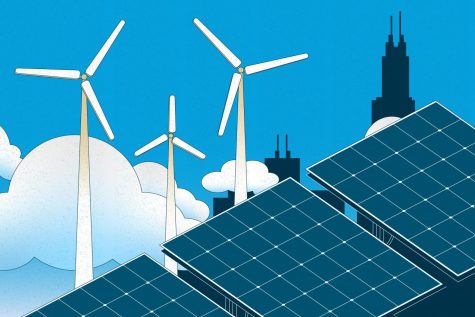Illinois tackles global climate crisis with Clean Energy Jobs Act
September 3, 2019

Blue states such as New York have been passing legislation in waves to combat the climate crisis amid a congressional stalemate on the topic. Illinois hopes to be one of these states, as it attempts to pass its own pseudo-Green New Deal. Yet, it is already falling behind in a key area: reaching its renewable energy goals.
The Clean Energy Jobs Act, or CEJA, is currently being debated in the Illinois General Assembly, although it is not expected to pass as is, according to Illinois Rep. Ann Williams (D-Chicago), one of the bill’s many sponsors.
The bill has not yet come up for a full vote in the General Assembly.
“We’re no longer talking about ensuring we protect our environment in a soft way,” Williams said. “We’re fighting for the future of our planet. We have no choice but to do whatever we can to make sure Illinois leads the way.”
As CEJA is debated, Gov. J.B. Pritzker also signed a bill Aug. 15 allowing Illinois to set its own limits of greenhouse gas emissions.
“While the federal government unravels the progress made under the Obama Administration, Illinois will not stand idly by,” Pritzker said in a statement, as reported by WTTW Aug. 20. “We’re stepping up to protect the lives of generations to come.”
CEJA—or what Williams calls a “blueprint for the future”—is described by those familiar with the bill as a more detailed version of the Green New Deal. CEJA, as it was originally proposed, is nearly 300 pages long.
CEJA calls for reaching 100% renewable energy in Illinois by 2050. It plans to do this by phasing out all coal use by 2030, replacing coal plants with clean energy, eliminating more than a million gas-powered vehicles and implementing more funding for solar power and wind turbines.
However, according to the Illinois Power Agency, Illinois is already behind on this goal, as the state is only projected to be at 10% renewable energy come 2025.
“We are facing a funding bottleneck in the next few years that will make it difficult to meet the 2025 goal and remain hopeful that legislation to address that bottleneck (and other issues) will be enacted,” said IPA Director Anthony Star in an Aug. 20 email statement to The Chronicle.
Both CEJA and the Green New Deal tackle two main aspects: Implementing eco-friendly infrastructure and cutting down on greenhouse gases; and ensuring the working class does not suffer as a result of sustainable changes.
One environmental advocate who supports the Green New Deal pending in Congress is Mary Freelove, a senior illustration major at Columbia.
“People who are all riled up about the Green New Deal probably don’t actually know what all it entails because they think it’s a lot more specific than it actually is,” Freelove said. “It’s about implementing more environmentally-friendly policies, but no specific [restrictions]. They’re not coming after the cows, they’re not trying to make everyone a vegetarian.”
When politicians propose changes that work to downsize industries such as coal and gas, it is often the workers who are put out of a job and suffer the consequences, Williams said. To combat this, CEJA is focused on creating a new economy based on green jobs so workers have access to training for jobs in renewable energy fields.
“Whether we’re talking about climate, access to healthcare, the rights of the disenfranchised [or] gun violence, those communities are always on the short end of the stick and that’s not right,” Williams said. “That is something everybody is starting to recognize. Regardless of what we’re doing legislatively, we need to keep in mind the communities that have been left behind. The communities we’re talking about have been disproportionately impacted by pollution. They’re the first ones to be hurt when these plants close.”
For Freelove, Illinois is in the perfect position to become a national leader on renewable energy, not only for its use of and potential for wind turbines, but also because of its dominant agriculture sector and a number of small farmers who may feel threatened by restrictions on their industries.
Freelove said by having an eco-friendly role model in the Midwest, farmers across the U.S. can see they have nothing to fear. Freelove said CEJA is an “admirable start” for the state, but said Illinois needs to work harder if it truly wants to accomplish its energy goals.
“We can achieve those [renewable energy] goals,” Williams said. “There’s no reason Illinois should not be a leader in this area.”
Unlike the Green New Deal, Williams is pushing for CEJA to be a bipartisan bill in a state as progressively blue as Illinois is.
Williams cited the success of Gov. J.B. Pritzker in helping to pass the most equitable recreational pot legalization and the most progressive pro-choice legislation in the country as telltale signs in future leadership from Illinois in combating the climate crisis.
“We are not going to sit back and watch Donald Trump roll the country [backward]; push communities of color and immigrant refugees to the wayside; spur negativity, toxicity toward entire communities,” Williams said. “We’re not going to sit idly by and let him promote a dying, aging industry that’s killing us. We’re going to fight back on the state level wherever we can. We have taken huge steps … but climate change is an issue we need to move forward with.”







